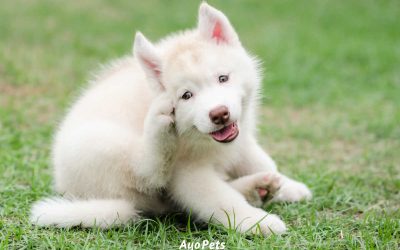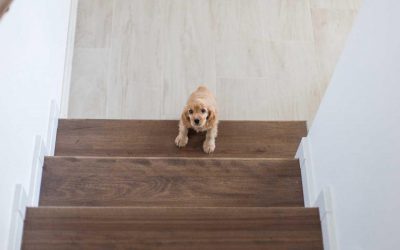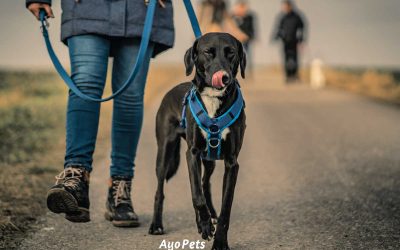Puppies love to play and run around, but all that fun makes it likely your puppy will get covered in mud or step in poop fairly often. You might be wondering if you should bathe your puppy and how often. Well…
Puppies can be bathed once a month with puppy shampoo until they are 6 months old. After this, bathe your puppy every 6 months or when needed. Puppies with skin allergies or conditions can be bathed once a month with medicated shampoo, but no puppy should be bathed more than once a week unless recommended by a veterinarian.
Hygiene and cleanliness are important, but did you know that washing your puppy too often or too young can make your puppy sick, or damage the puppy’s fur and strip the skin’s natural oils?
The first question we need to ask ourselves is how often puppies really need baths to stay clean and healthy…
Recommended products in this post (affiliate links)
Burt’s Bees 2-in-1 Shampoo and Conditioner
Oatmeal puppy shampoo for itchy skin
Flea and tick treatment shampoo for puppies
Puppy-friendly whitening shampoo with no harsh chemicals
How often you should bathe a puppy
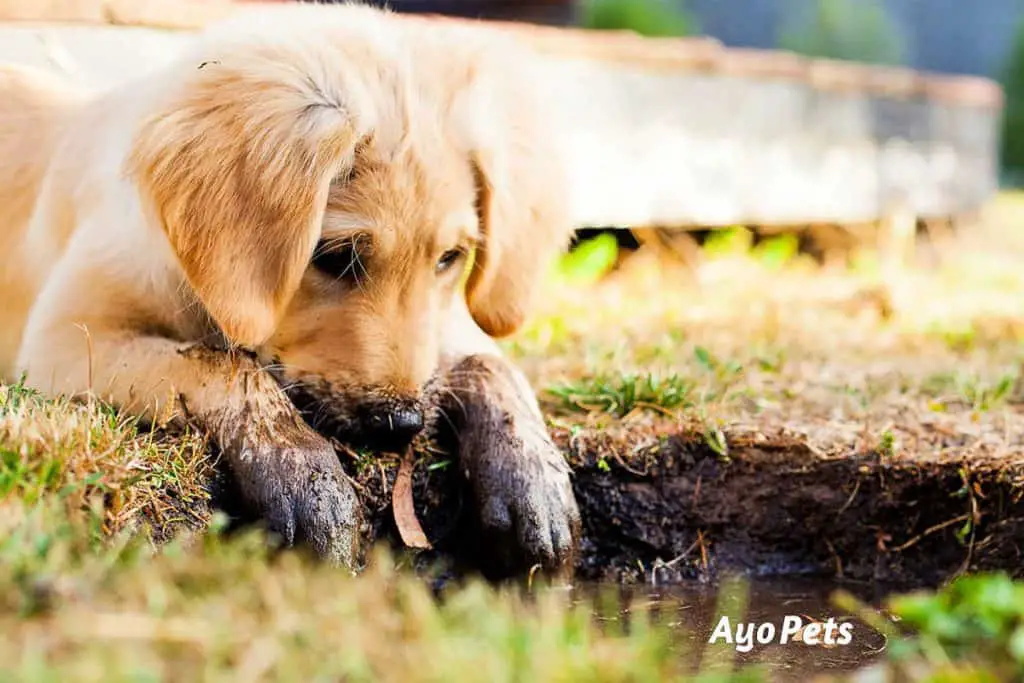
Healthy puppies don’t need set baths or a fixed bathing schedule, and it’s best to bathe them only when necessary or when taking them in for their first haircut.
Many veterinarians recommend washing a puppy that is between 3 and 6 months old no more than once a month with puppy shampoo.
A puppy’s adult fur grows out when the puppy is between 6 months and 1.5 years old. This fur helps to protect the dog’s skin, where there are oils that keep the skin healthy and clean.
Once your puppy is 6 months old, you can go as long as 6 months or more between washes without any problems.
Most dogs mature into adult dogs between 12 and 24 months. Click HERE to find out how often you need to bathe an adult dog.
A healthy puppy needs to be bathed only when it is:
- Dirty, for example when your puppy has been rolling in the mud (just make sure your puppy doesn’t eat the dirt)
- Smells bad from rolling in something smelly. If your puppy’s skin smells strange it may be caused by a skin condition that needs medicated shampoo or a change in diet to heal – visit your veterinarian for advice on how to fix the cause rather than trying to hide the symptoms with puppy shampoo
- Has fleas, ticks, and/or cannot take oral parasite treatments
- Is being groomed and/or getting trimmed
A healthy puppy does not need to be bathed for the sake of bathing because:
1. Its skin has oils in it to keep the puppy clean and
2. A puppy can groom itself
Here’s how puppies stay clean without taking baths…
A puppy’s skin oils help keep it clean
A puppy’s skin has 3 layers:
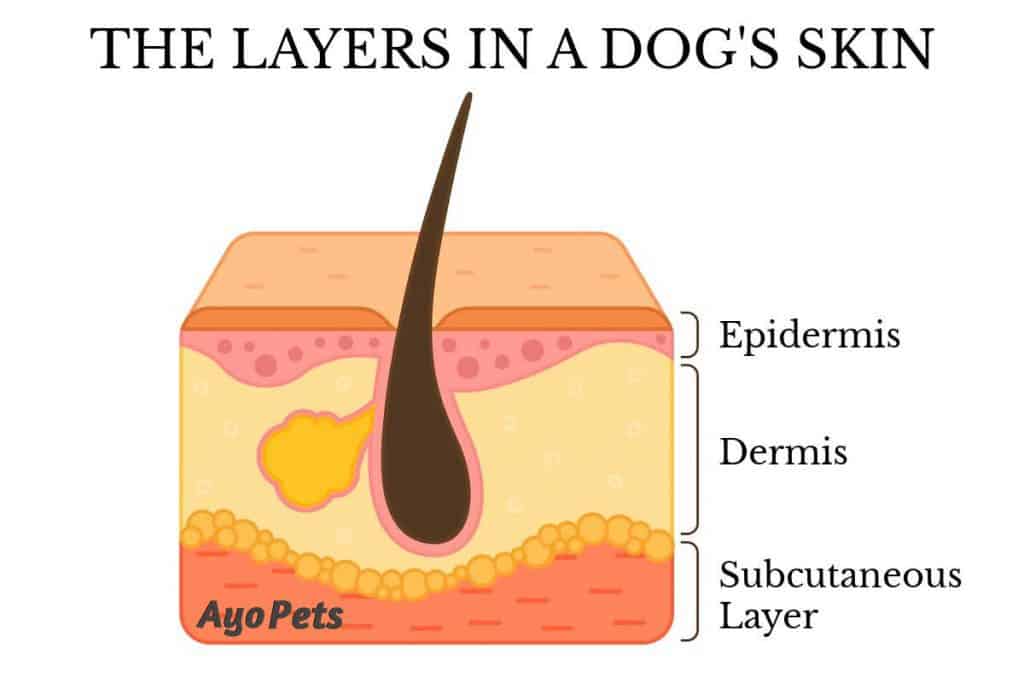
- The epidermis, which is the outer layer that you can see with hair on it
- The dermis sits under the epidermis. This is where the self-cleaning process begins with oil glands called sebaceous glands (see below)
- The subcutaneous layer, which is where the puppy’s fat and muscle tissues are found
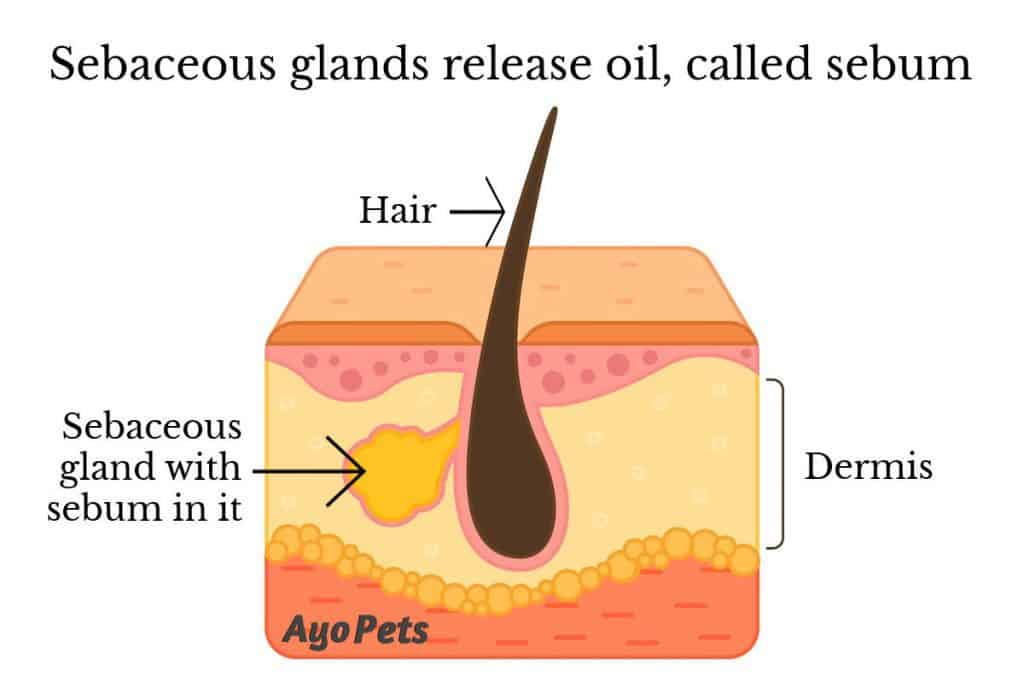
Do you see the sebaceous gland in the dermis layer? Sebaceous glands are attached to hair follicles in the dermis.
These sebaceous glands in the puppy’s skin release an oil called ‘sebum’. According to research, sebum keeps the skin moist and healthy, protects it from the environment, kills bacteria, and keeps it clean.
But how does oil actually help to keep a puppy’s skin and fur clean?
When a puppy is healthy and the skin is coated with sebum, the sebum stops dirt particles from sitting on the puppy’s skin. Sebum acts as a dirt repellent.
Sebum also lubricates the puppy’s hair. As the oil moves from the skin to the end of each hair, it takes dirt with it.
If you want to activate this natural, healthy way to clean your puppy without a bath, simply give your puppy a brush (click here to find out how often to brush your puppy) . Brushing will help to move sebum across your puppy’s skin and through the coat, removing dirt and making the skin and hair soft and shiny.
But sometimes puppy owners do things that can strip or remove all of this natural sebum from a puppy’s skin, which may give the puppy skin problems, brittle hair, and other health issues.
We often wash our puppy more often when a puppy gets these conditions, thinking we are sorting out the issue. But washing more often just makes the skin problem worse or the hair even more brittle because we are washing away the puppy’s sebum.
Soon we find ourselves in a vicious cycle of causing the problem with over-washing and making it worse with over-washing, when the puppy can sort this out naturally without any harsh cleaners, medications, and chemicals.
To maintain healthy sebum levels in your puppy, make sure you:
- Use lukewarm water when you wash your puppy. Hot water isn’t good for a puppy’s skin
- Don’t wash your puppy too often – puppies can be bathed once a month until they are 6 months old. After this, bathe your puppy every 6 months or when needed.
- Use a mild shampoo that’s designed for puppies, such as this 2-in-1 puppy shampoo and conditioner from Amazon. Strong soapy shampoos and human shampoos will strip your puppy’s skin of all its natural sebum and may do more harm than good
- Brush your puppy regularly, about once a week, to move sebum along the skin and through the fur coat
How puppies clean themselves
Puppies don’t take daily baths with soap and water in nature while they run around in packs, so they have developed their own ways to groom their skin and coat.
A puppy will develop its own cleaning routine, which it will probably keep throughout the rest of its life. Some puppies love to groom themselves at certain times or after certain activities, such as eating, while other puppies only groom when they have to.
You will get to know your puppy’s grooming routine over time and what’s normal for that dog. If there is a sudden change in grooming, such as excessive licking or nibbling, then check the dog for scabs, ticks, or other problems.
Here are some of the ways that puppies might groom themselves:
Nibbling their skin
Puppies may ‘nibble’ their skin. They do this by gripping a small piece of skin between their front teeth and gently biting the skin and releasing it as they move their mouth in a line or around an area.
Puppies might nibble because they are itching in that spot, but this is also a way that dogs remove things stuck in their fur.
Nibbling also helps with dry skin. This nibbling action stimulates the sebaceous glands to release more sebum, the oil that moisturizes the animal’s skin. When there isn’t enough oil being released, puppies can often get dandruff. Click here to find out more about puppy dandruff.
The nibbling action is also like a brush moving through the puppy’s fur – it moves sebum along the skin and through the hair to remove dirt.
Licking themselves
Puppies may spend time licking their fur, skin, legs and paws as a way to wash themselves clean.
Rubbing their face
A puppy with a dirty face will often rub its face along the ground and scratch its face with its paws, to remove food and dirt.
Rolling around
To remove dirt, fur, and dust from their coats, puppies may roll around on the ground.
They may roll while lying on their sides and kick their legs, or they could lie on their back and swing their butts from side to side to get a good back rub.
Shaking themselves off
Puppies may shake themselves to loosen and remove dirt in their fur and on their skin.
They also do this when they’re wet, to dry themselves off quicker.
At what age can a puppy take its first bath?
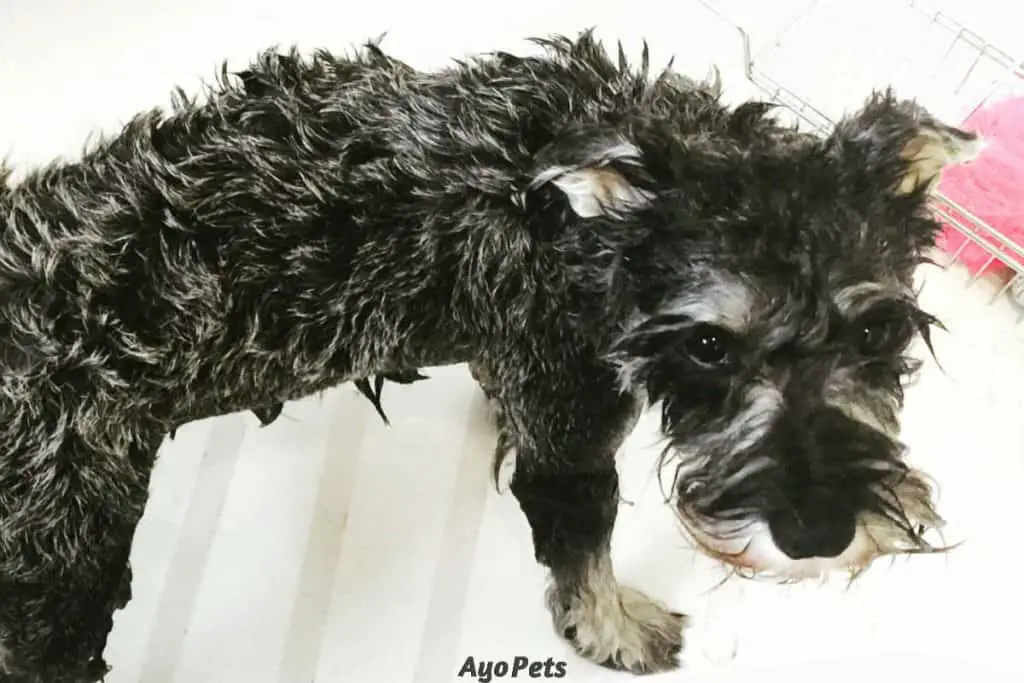
A puppy can take its first bath when it is between 8 and 12 weeks old. If a puppy gets dirty before 8 weeks old, simply wipe off the dirt with a warm, wet sponge or cloth and dry the area immediately.
Puppies have lower body temperatures than adult dogs. From birth to about seven weeks of age, a puppy’s body naturally starts warming up from 97°F to around 101°F.
A few degrees does not sound like much of a difference, but it is big in a little puppy’s life!
Puppies are colder than adult dogs. They can’t keep their body temperature as stable as adult dogs or make themselves warmer like adult dogs.
So, a puppy is much more likely to get very cold after getting wet by a bath.
If the puppy gets too cold, it could get hypothermia. If left untreated, the puppy could die from this.
What makes a puppy need baths more often?
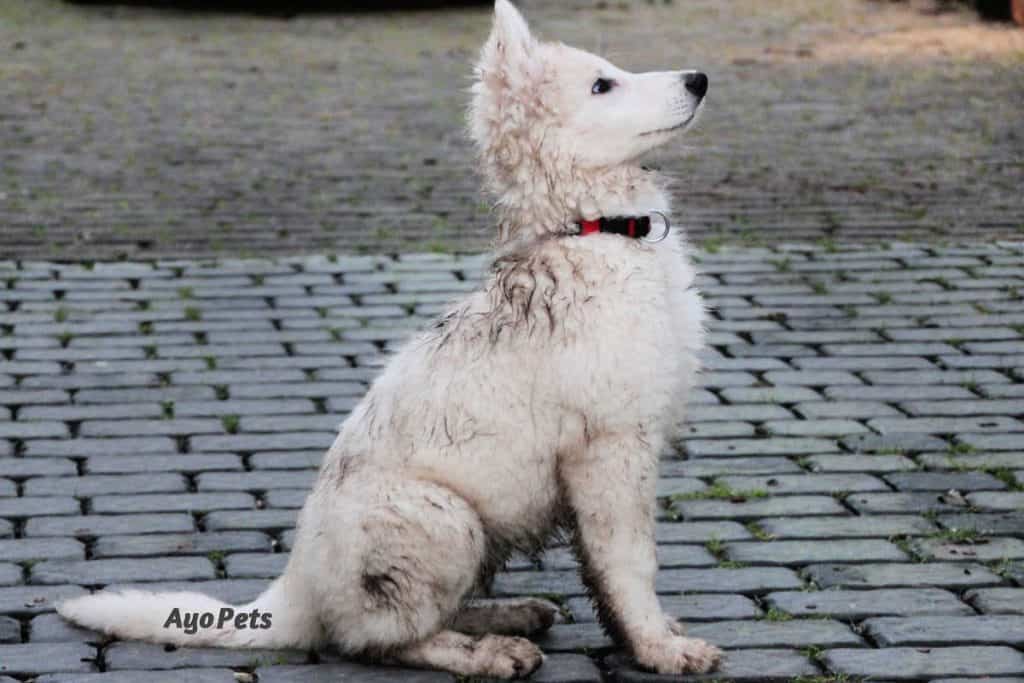
Some puppies need to be bathed more often than others simply because they:
- Spend a lot of time outdoors and love playing in the dirt
- Have long hair that traps dirt and gets matted
- Have curly hair that needs to be groomed and trimmed regularly
- Have a soft coat that holds dust and dirt
- Sleep in your bed – and you want to give them baths once a month for hygiene reasons
- Have skin conditions that require washes with a medicated shampoo – skin conditions are the main cause of bad smell in puppies and should be fixed through diet and medication rather than trying to wash away the smell
- Are hairless – hairless puppy breeds need regular sponge baths to remove dirt and dead skin cells as they don’t have sebum and fur to help them stay clean
- Have an itchy skin – wash your puppy with an oatmeal puppy shampoo (Amazon link) to relive the itchiness on a puppy’s skin
- Cannot take oral parasite treatments and need baths to control ticks and fleas – here’s a flea and tick shampoo that can be used on puppies older than 12 weeks (Amazon link)
- Have a white or light coat that shows dirt easily and is dirty or stained – here’s a puppy-friendly whitening shampoo with no harsh chemicals
Again, only bathe puppies when necessary, and never more than once a week unless your veterinarian advises you to do so.
What makes a puppy need baths less often?
Puppies with the following characteristics tend to need fewer baths:
- Short-haired puppies
- Puppies with a hard, wiry coat
- Puppies with smooth coats
- Puppies with water-repellant coats – washing too often removes their natural oils
- Puppies with thick, double coats – these puppies need brushing more often than washing to keep their coats clean and shiny
Signs you’re bathing your puppy too often
The following signs tell you that you may be bathing your puppy too often.
If your puppy has any of the following signs, try washing your puppy less often, changing to a more nutritious diet (click here to find out if it’s cheaper to make your own nutritious puppy food or buy it), or visit your veterinarian for recommendations.
Wash your puppy less often if he/she has:
- Skin irritations
- Dry, itchy skin
- An oily skin, which is your puppy’s body trying to replace the natural oils you keep washing away
- Flaking skin
- Brittle hair that breaks easily
- A dull coat




